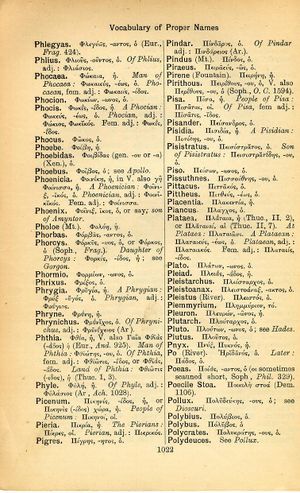Polybus: Difference between revisions
From LSJ
Κενῆς δὲ δόξης οὐδὲν ἀθλιώτερον → Nihil est inani gloria infelicius → Als leerer Ruhm jedoch ist nichts unseliger
m (Text replacement - "link={{" to "link={{") |
m (Text replacement - "(|thumb)\n(\|link=)" to "$1$2") |
||
| Line 1: | Line 1: | ||
{{WoodhouseENELnames | {{WoodhouseENELnames | ||
|Text=[[File:woodhouse_1022.jpg|thumb | |Text=[[File:woodhouse_1022.jpg|thumb|link={{filepath:woodhouse_1022.jpg}}]]Πόλυβος, ὁ. | ||
|link={{filepath:woodhouse_1022.jpg}}]]Πόλυβος, ὁ. | |||
}} | }} | ||
{{Lewis | {{Lewis | ||
Revision as of 16:55, 18 May 2020
English > Greek (Woodhouse)
Πόλυβος, ὁ.
Latin > English (Lewis & Short)
Pŏlybus: i, m., = Πόλυβος.
I A king of Corinth, at whose court Œdipus was brought up, Stat. Th. 1, 64; Hyg. Fab. 66; 67; Sen. Oedip. 12.—
II One of Penelope's suitors, Ov. H. 1, 91.
Latin > French (Gaffiot 2016)
Pŏlўbus, ī, m. (Πόλυβος), Polybe [roi de Corinthe, qui recueillit et éleva Œdipe] : Stat. Th. 1, 64 || un des prétendants de Pénélope : Ov. H. 1, 91.

